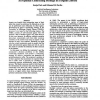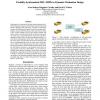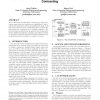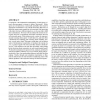122
click to vote
MAGS
2008
15 years 2 months ago
2008
This paper presents a decentralized model that allows self-interested agents to reach "win-win" agreements in a multi-attribute negotiation. The model is based on an alt...
117
click to vote
AAAI
1996
15 years 3 months ago
1996
Agents can benefit from contracting some of their tasks that cannot be performedby themselves or that can be performed moreefficiently by other agents. Developing an agent's ...
114
click to vote
ICMAS
2000
15 years 3 months ago
2000
In automated negotiation systems consisting of self-interested agents, contracts have traditionally been binding. Leveled commitment contracts--i.e., contracts where each party ca...
112
click to vote
ICMAS
1998
15 years 3 months ago
1998
Automated negotiation and coalition formation among self-interested agents are playing an increasingly important role in electronic commerce. Such agents cannot be coordinated by ...
117
click to vote
AAAI
2008
15 years 4 months ago
2008
In this paper, we combine for the first time the methods of dynamic mechanism design with techniques from decentralized decision making under uncertainty. Consider a multi-agent s...
133
click to vote
AGENTS
2001
Springer
15 years 6 months ago
2001
Springer
We are interested in multi-agent contracting, in which customers must solicit the resources and capabilities of other, self-interested agents in order to accomplish their goals. G...
108
click to vote
ATAL
2003
Springer
15 years 7 months ago
2003
Springer
Cooperation is the fundamental underpinning of multi-agent systems, allowing agents to interact to achieve their goals. Where agents are self-interested, or potentially unreliable...
106
click to vote
ATAL
2004
Springer
15 years 7 months ago
2004
Springer
Several innovative software applications such as those required by ambient intelligence, the semantic grid, e-commerce and e-marketing, can be viewed as open societies of heteroge...
106
click to vote
ARGMAS
2004
Springer
15 years 7 months ago
2004
Springer
Negotiation can be conceived as the exchange of messages among self-interested agents in order to settle on an agreement over a given issue. They decide which messages to send acco...
130
click to vote
NORMAS
2005
Springer
15 years 7 months ago
2005
Springer
In this paper, we argue that allowing self-interested agents to activate social institutions during run-time can improve the robustness (i.e., stability, cooperation or fairness) ...




